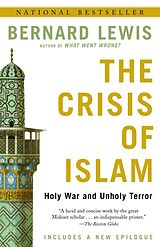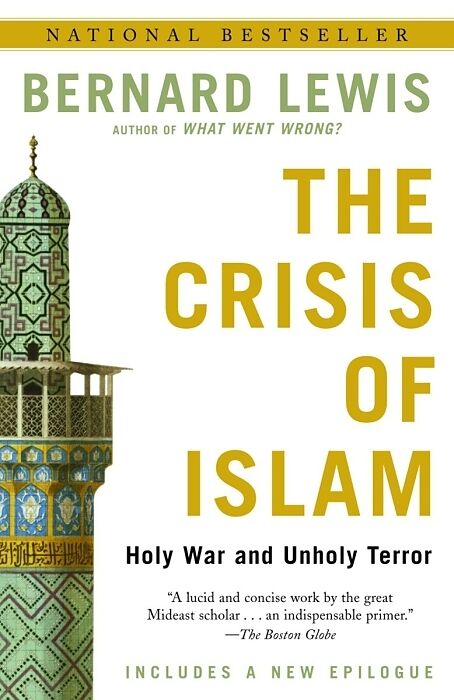The Crisis of Islam
Einband:
Taschenbuch
EAN:
9780812967852
Untertitel:
Holy War and Unholy Terror
Genre:
Geschichte
Autor:
Bernard Lewis
Herausgeber:
Random House N.Y.
Anzahl Seiten:
224
Erscheinungsdatum:
02.03.2004
ISBN:
0812967852
Zusatztext Terrorism requires only a few. Obviously the West must defend itself by whatever means will be effective. But in devising means to fight the terrorists! it would surely be useful to understand the forces that drive them. from the Introduction Remarkably succinct . . . It offers a long view in the midst of so much short-termism and confusing punditry. Lewis has done us allMuslim and non-Muslim alikea remarkable service. The New York Times Book Review Inestimable . . . replete with the exceptional historical insight that one has come to expect from the world's foremost Islamic scholar. The Wall Street Journal A timely and provocative contribution to the current raging debate about the tensions between the West and the Islamic world. BusinessWeek No scholar of Islam in the Western world has more thoroughly earned the respect of generalists and academics alike than Bernard Lewis. . . . An excitingly knowledgeable antidote to today's natural sense of befuddlement. . . . History with electric immediacy. Baltimore Sun Informationen zum Autor Bernard Lewis is the Cleveland E. Dodge Professor of Near Eastern Studies Emeritus at Princeton University and the author of The Middle East: A Brief History of the Last 2,000 Years , a National Book Critics Circle Award finalist; The Emergence of Modern Turkey; The Arabs in History ; and What Went Wrong?: Western Impact and Middle Eastern Response , among other books. Lewis is internationally recognized as one of our era's greatest historians of the Middle East. His books have been translated into more than twenty languages, including Arabic, Persian, Turkish, and Indonesian. He lives in Princeton, New Jersey. Klappentext In his first book since What Went Wrong? Bernard Lewis examines the historical roots of the resentments that dominate the Islamic world today and that are increasingly being expressed in acts of terrorism. He looks at the theological origins of political Islam and takes us through the rise of militant Islam in Iran, Egypt, and Saudi Arabia, examining the impact of radical Wahhabi proselytizing, and Saudi oil money, on the rest of the Islamic world. The Crisis of Islam ranges widely through thirteen centuries of history, but in particular it charts the key events of the twentieth century leading up to the violent confrontations of today: the creation of the state of Israel, the Cold War, the Iranian Revolution, the Soviet defeat in Afghanistan, the Gulf War, and the September 11th attacks on the United States. While hostility toward the West has a long and varied history in the lands of Islam, its current concentration on America is new. So too is the cult of the suicide bomber. Brilliantly disentangling the crosscurrents of Middle Eastern history from the rhetoric of its manipulators, Bernard Lewis helps us understand the reasons for the increasingly dogmatic rejection of modernity by many in the Muslim world in favor of a return to a sacred past. Based on his George Polk Award-winning article for The New Yorker , The Crisis of Islam is essential reading for anyone who wants to know what Usama bin Ladin represents and why his murderous message resonates so widely in the Islamic world. Chapter 1 Defining Islam It is difficult to generalize about Islam. To begin with, the word itself is commonly used with two related but distinct meanings, as the equivalents both of Christianity and of Christendom. In the one sense it denotes a religion, a system of belief and worship; in the other, the civilization that grew up and flourished under the aegis of that religion. The word Islam thus denotes more than fourteen centuries of history, a billion and a third people, and a religious and cultural tradition of enormous diversity. Christianity and Christendom represent a...
Autorentext
Bernard Lewis is the Cleveland E. Dodge Professor of Near Eastern Studies Emeritus at Princeton University and the author of The Middle East: A Brief History of the Last 2,000 Years, a National Book Critics Circle Award finalist; The Emergence of Modern Turkey; The Arabs in History; and What Went Wrong?: Western Impact and Middle Eastern Response, among other books. Lewis is internationally recognized as one of our era’s greatest historians of the Middle East. His books have been translated into more than twenty languages, including Arabic, Persian, Turkish, and Indonesian. He lives in Princeton, New Jersey.
Klappentext
In his first book since What Went Wrong? Bernard Lewis examines the historical roots of the resentments that dominate the Islamic world today and that are increasingly being expressed in acts of terrorism. He looks at the theological origins of political Islam and takes us through the rise of militant Islam in Iran, Egypt, and Saudi Arabia, examining the impact of radical Wahhabi proselytizing, and Saudi oil money, on the rest of the Islamic world.
The Crisis of Islam ranges widely through thirteen centuries of history, but in particular it charts the key events of the twentieth century leading up to the violent confrontations of today: the creation of the state of Israel, the Cold War, the Iranian Revolution, the Soviet defeat in Afghanistan, the Gulf War, and the September 11th attacks on the United States.
While hostility toward the West has a long and varied history in the lands of Islam, its current concentration on America is new. So too is the cult of the suicide bomber. Brilliantly disentangling the crosscurrents of Middle Eastern history from the rhetoric of its manipulators, Bernard Lewis helps us understand the reasons for the increasingly dogmatic rejection of modernity by many in the Muslim world in favor of a return to a sacred past. Based on his George Polk Award-winning article for The New Yorker, The Crisis of Islam is essential reading for anyone who wants to know what Usama bin Ladin represents and why his murderous message resonates so widely in the Islamic world.
Leseprobe
Chapter 1
Defining Islam
It is difficult to generalize about Islam. To begin with, the word itself is commonly used with two related but distinct meanings, as the equivalents both of Christianity and of Christendom. In the one sense it denotes a religion, a system of belief and worship; in the other, the civilization that grew up and flourished under the aegis of that religion. The word Islam thus denotes more than fourteen centuries of history, a billion and a third people, and a religious and cultural tradition of enormous diversity. Christianity and Christendom represent a greater number and a longer period-more than 2 billion people, more than twenty centuries, and even greater diversity. Nevertheless, certain generalizations can be and are made about what is variously called Christian, Judeo-Christian, post-Christian, and-more simply-Western civilization. While generalizing about Islamic civilization may be difficult and at times in a sense dangerous, it is not impossible and may in some ways be useful.
In space, the realm of Islam extends from Morocco to Indonesia, from Kazakhstan to Senegal. In time it goes back more than fourteen centuries, to the advent and mission of the Prophet Muhammad in Arabia in the seventh century c.e. and the creation under him of the Islamic community and state. In the period which European historians see as a dark interlude between the decline of ancient civilization-Greece and Rome-and the rise of modern civilization-Europe, Islam was the leading civilization in the world, marked as such by its great and powerful kingdoms, its rich and varied industry and commerce, its original and creative sciences and letters. Islam, far more than Christendom, was the intermediate stage between the ancient East and the modern West, to which it contributed significantly. But during the past three centuries, the Islamic…

Leider konnten wir für diesen Artikel keine Preise ermitteln ...
billigbuch.ch sucht jetzt für Sie die besten Angebote ...
Die aktuellen Verkaufspreise von 6 Onlineshops werden in Realtime abgefragt.
Sie können das gewünschte Produkt anschliessend direkt beim Anbieter Ihrer Wahl bestellen.
Loading...
Die aktuellen Verkaufspreise von 6 Onlineshops werden in Realtime abgefragt.
Sie können das gewünschte Produkt anschliessend direkt beim Anbieter Ihrer Wahl bestellen.
| # | Onlineshop | Preis CHF | Versand CHF | Total CHF | ||
|---|---|---|---|---|---|---|
| 1 | Seller | 0.00 | 0.00 | 0.00 |
